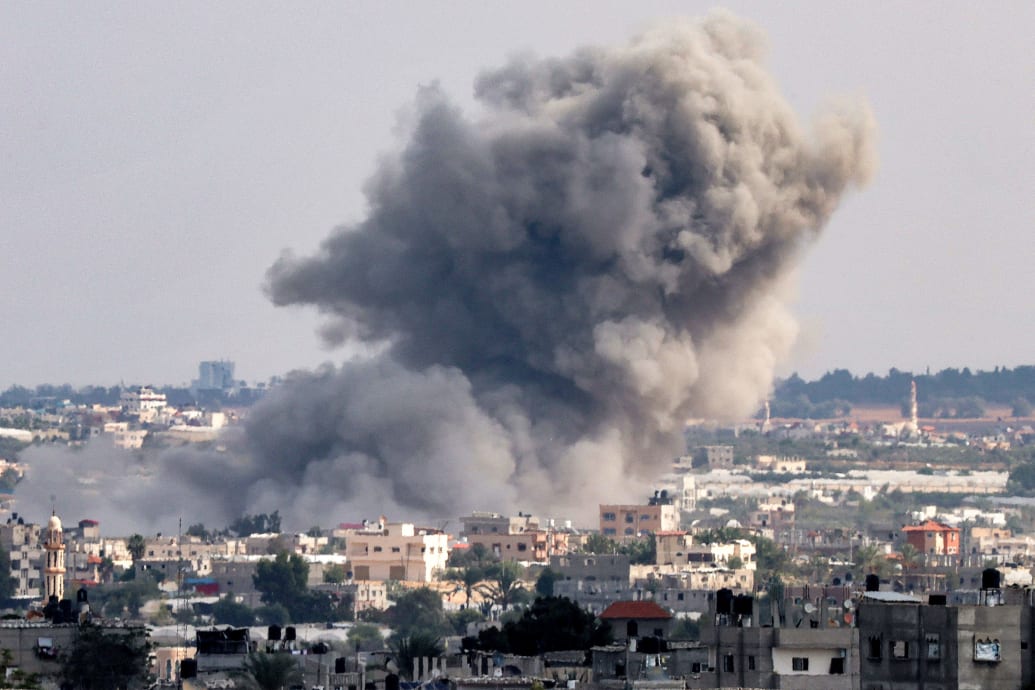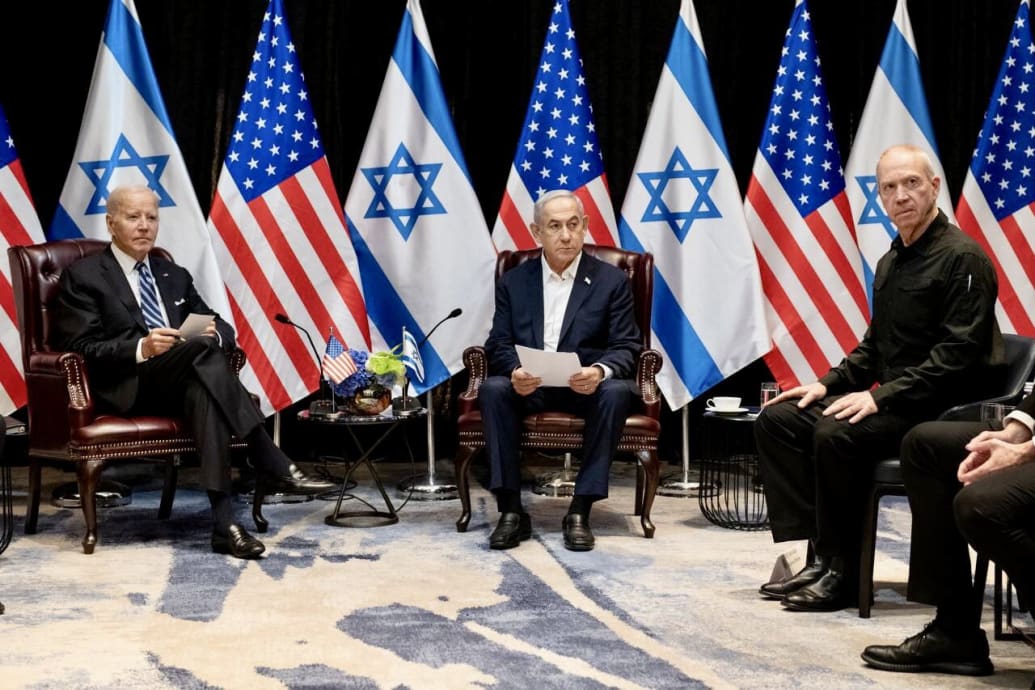Biden and Netanyahu Look Headed for a Breakup on U.S. Support for Gaza War

A reckoning is coming for the Biden’s administration’s partnership with Prime Minister Benjamin Netanyahu and his government in Israel.
While the immediate support the U.S. showed for Israel in the wake of Hamas’ wanton atrocities of Oct. 7 was humane and appropriate, founded (as New York magazine’s Jonathan Chait has noted) in President Joe Biden’s moral decency, that very same Biden character trait will very likely soon require a rift with Netanyahu.
That is because the Israeli prime minister and the extremists in his government are fundamentally bad actors who have contributed greatly to the current crisis.
It is the profound flaws of judgment and instincts of Bibi & Co. that will require Biden and his team to demand a significant change of course by Israel. Should that change not come, it will then be the deep-seated values of Biden and his team and their clear sense of U.S. national interests that will require what will be a major adjustment in U.S. policy.
Events of the past several days suggest that rift is not far off.
As Israel’s offensive in Gaza has begun, the carnage it has produced has been awful and the weeks ahead promise worse to come. The language of Netanyahu—the total war framing of the conflict by him and his team—has been confirmed by the high civilian toll of their military operations to date.
Israel’s ferocity is of course, in large part explained by the sickening memories of what the Hamas terrorists did during their Oct. 7 rampage. But however justified even the harshest of language and actions may feel, Netanyahu and his supporters have signaled with their words and their actions that they have not taken on board the admonitions of Biden, Secretary of State Antony Blinken, National Security Advisor Jake Sullivan, and others to respect international law and the rules of war, to prioritize humanitarian needs, and to act in a way that is consistent with the ultimate goal of an enduring political solution to this decades-old conflict.
On Oct. 16, Netanyahu posted a tweet, later removed, in which he described the struggle with Hamas as a “struggle between the children of light and the children of darkness, between humanity and the law of the jungle.” Days later, in televised remarks announcing the beginning of expanded military action in Gaza, Netanyahu referred to a Biblical passage about the Amalekites, a group wiped out by divine intervention. As Nicholas Kristof wrote in The New York Times, “Netanyahu wasn’t advocating that literal policy, but Amalek is a code word that regularly crops up in Israeli politics for a ruthless enemy that must be crushed without mercy.”
In both instances, Netanyahu blurred the distinction between Hamas and Palestinians more generally, implicitly justifying attacks not just on the terrorist organization, but on all the residents of Gaza. While defenders of the Prime Minister may deny this, the consequences of Israeli actions in Gaza belie those denials.

Smoke plumes billow after an explosion during Israeli bombardment in Rafah in the southern Gaza Strip on October 18, 2023.
Said Khatib / Getty
The message of no mercy has been repeated by other Israeli politicians throughout the last three weeks. One, a member of Netanyahu’s parliamentary coalition, Galit Distel Atbaryan, said, “Erase all Gaza from the face of the earth. That the Gazan monsters will fly to the southern fence and try to enter Egyptian territory or they will die and their death will be evil. Gaza should be erased.”
Meanwhile, efforts to put even more pressure on Palestinians in the West Bank have escalated—which is saying something given the ultra-aggressive policies of the Netanyahu government regarding expanding Israeli settlements and even arming settlers for conflict with their Palestinian neighbors. And Israeli spokespeople have asserted that they will have to steel themselves against international criticism to carry out what they have in mind for Gaza–a sure sign they are tuning out calls for mercy and restraint.
While Israel defended its attacks in Gaza that have produced significant civilian casualties, like multiple assaults on the Jabalia refugee camp, as being the fault of Hamas for locating in or underneath the camp, UN Human rights officials said, “We have serious concerns that these are disproportionate attacks that could amount to war crimes.”
The Biden administration has tried mightily to contain or control Netanyahu through its “bear hug” policy. They refused to even greenlight a Biden visit to Israel in the wake of the Hamas attacks until hours of negotiation with Secretary Blinken produced an agreement to allow humanitarian supplies into Gaza. The Biden team then continued to press the Israelis on this point. Biden himself on Wednesday touted the progress that has been made by opening the Gaza-Egyptian border as being thanks to U.S. leadership, a not-so-subtle message that the breakthrough would not have come without U.S. intervention.
Meanwhile, in the U.S., the Biden administration has been active in seeking to stop hate crimes that the conflict has triggered—both against Jews and against Muslims. This week alone they have launched a major program combating hate on college campuses and the “First-Ever National Strategy to Counter Islamophobia.”

President Joe Biden, Israeli Prime Minister Benjamin Netanyahu, and Israeli Defense Minister Yoav Gallant meet in Tel Aviv on October 18, 2023.
Israeli Ministry of Defense / Getty
Throughout the crisis Biden has walked a tightrope, seeking to support an ally while also seeking to protect the human rights of Palestinians and to advance—with a vocal commitment not seen in any other recent U.S. president—a lasting two-state solution to the Israel-Palestine conflict. Thus far, the approach has helped constrain Israeli behavior and produced humanitarian progress. It has also included a major aid package for Israel that is now before the (dysfunctional) U.S. Congress. The balance they have sought is sound foreign policy, but it has also produced blowback from the right and the left and isolated the U.S. on the issue with major allies.
Sometimes good policies do that. The question is: How long can that balance be maintained?
The horrific scenes out of Jabalia and the Israeli attacks that have resulted in the destruction or damage of at least 45 percent of Gaza’s housing units can only be seen not just as evidence of the savagery of this war but as warnings of worse to come. Already, credible estimates suggest that 3,600 Palestinian children have been killed in the first three weeks of this war and the overall death toll is almost certainly in excess of 8,000.
While the blow suffered by the Israeli people on Oct. 7 was grave and the crimes committed against them unspeakable, one dark question has loomed from the outset of Israel’s response to that wanton violence: How many Palestinians must die in exchange for those losses?
“At the pace of the destruction of Gaza, given the daily death tolls and heartbreaking scenes of loss, it does not seem likely that it is sustainable for more than days or perhaps a few weeks.”
No one will or should shed a tear for Hamas terrorists who are killed. But it is not only reasonable but essential to question how many innocent Palestinian deaths are “warranted” or “justifiable” as part of Israel’s war?
The answer, of course, is that the death of one innocent victim does not justify the taking of the life of another.
The ratio of those killed is now five Palestinians to one Israeli. Will the Biden administration be able to tolerate ten to one? Fifteen to one? Twenty to one?
Whether they like it or not, their support for Israel is already seen as enabling the bloodshed. No matter how hard they fight behind the scenes to avoid such results, they will be seen by the world at large as partially responsible for it. And naturally, if their efforts to influence Israel with behind the scenes suasion fail, they must choose another course.
Further–and another clear reason for a change in the Israeli approach–is that there is no evidence that waging a full-scale war against terrorists actually works. Certainly, that was the experience of the U.S.
Two massive multi-trillion dollar wars in the Middle East ended up producing more terrorists today than existed on 9/11. Bin Laden is gone. But the Taliban is back. And clearly, the region as a whole is no closer to peace today than it was when we intervened with all our might, know-how, and a twisted self-righteousness that sounded very much like the Israeli government of today.
Hundreds of thousands of innocent civilians died as a result of our moral and strategic failures. Just as President Biden has argued Israel should not repeat our errors, we must also not compound our own past mistakes by supporting the misguided policies of an ally.
“The ratio of those killed is now five Palestinians to one Israeli. Will the Biden administration be able to tolerate ten to one? Fifteen to one? Twenty to one?”
So, Israel’s plan of action is both increasingly morally intolerable and strategically flawed. So long as the U.S. feels it has more influence from its current approach than it does from drawing a red line and threatening to actively distance itself from Israel, it will do so. But clearly, the course of the conflict today requires us to ask how long that can or should last?
At the pace of the destruction of Gaza, given the daily death tolls and heartbreaking scenes of loss, it does not seem likely that it is sustainable for more than days or perhaps a few weeks.
Secretary of State Blinken is headed to Israel again. One hopes that in his meeting—and in the regular exchanges between Biden and Netanyahu—it is made very clear that there are limits to what we will tolerate. The U.S. has already called for temporary humanitarian pauses in the fighting. The Biden administration must make it clear that unless the Israelis take far more effective steps to limit civilian casualties from their operations in Gaza—and they also achieve real, swift progress in eliminating Hamas’ leadership of Gaza—that the U.S. spigot of support will be turned shut.
The U.S. has yet to publicly embrace the idea of ceasefire, but Biden must let the Israeli leadership know that if they continue to wage this war as they have, we will do so soon. (He has taken a step in this direction by calling for a temporary cessation of hostilities to get the hostages out.) Indeed, in my view, the time for an end to Israel’s planned massive, protracted Gaza-wide operations is now. Frankly, that approach should never have been undertaken in the first place.
Let Israel pursue the destruction of Hamas in the way such efforts are historically best achieved—via covert operations, special operations, targeted destruction of weapons supplies, closing off financial support, sanctioning the sponsors of the terrorists. Punishing Gazans further will have the effect of fueling further extremism and giving birth to new threats. How do we know? Because, again, that is the lesson of our experience through decades of combating terrorists in the region.
The U.S. should go even further. We should indicate we will actively support a major two-state peace initiative as the only acceptable outcome of this fighting.
The political factions who have opposed such initiatives, led for nearly thirty years by Netanyahu, have failed miserably. One way or another we must also indicate that we expect to see him and the opponents of real progress on peace go or Israel can expect to see a real reduction in U.S. support for Israel.
Nov. 4 is an important day in Israel. It is the day in 1995 that then-Prime Minister Yitzhak Rabin was gunned down by a radical Israeli extremist who opposed his efforts to negotiate peace with the Palestinians.
The political opposition to Rabin was led by Benjamin Netanyahu. He presided over protests at which the chants were “Death to Rabin.” Four months before Rabin’s assassination Netanyahu marched at the head of a mock funeral for Rabin, champion of the Oslo Accords. From then until now, Netanyahu’s opposition to peace has directed Israel away from the future Rabin saw and worked towards.
Rabin, a former general, was a realist. He said, “We must fight terrorism as if there’s no peace process, and work to achieve peace as if there’s no terror.” He also said during his Nobel Prize lecture, “There is only one radical means of sanctifying human lives. Not armored plating, or tanks, or planes or concrete fortifications. The one radical solution is peace.”
This Nov. 4 we should hope that after almost three decades of relentless efforts of the Israeli right and Hamas terrorists to bury the aspirations of the Israeli statesman, that we use the lessons of this conflict to embrace and once again lift up what he understood.
War is not the path to a secure future for Israel and the Palestinians. Extremists in both camps are the enemies of peace.
We must have the courage to do what is harder than war. Indeed, we must recognize that, once again, the horrors of conflict are visiting this region precisely because, for the Netanyahu government and the leadership of Hamas, doing what is right and necessary to achieve a political solution that benefits all Israelis and Palestinians is actually much harder than slaughtering their neighbors and then trying to justify their indefensible actions.
If the Biden administration is (as I believe it is) a sincere advocate for a lasting peace between Israel and the Palestinians, then it must soon make it plain that the Israeli leadership it stands with is that of Yitzhak Rabin—and not of the enemies of peace whose path to power began with his murder.
A rift is coming. And if it comes because Netanyahu cannot be steered away from his current path, that is a necessary and very good thing.




